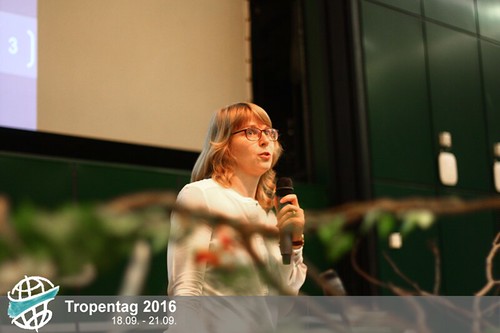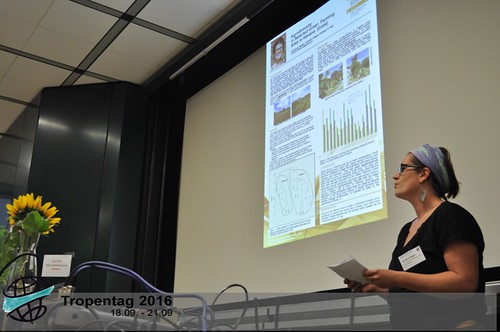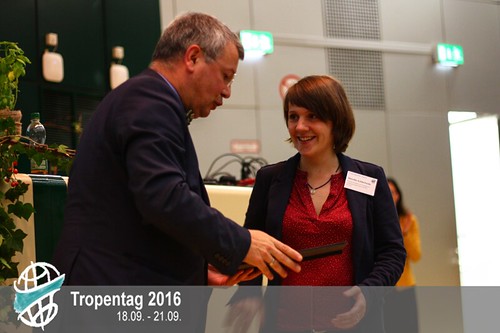People 2016
Bringing communities together for sustainable and fair use of forestry resources in Chobe, Botswana
Wed, 09/21/2016 - 16:12 — Kootlole
Interview: „Solidarity must become a subject of research!“
Tue, 09/20/2016 - 12:10 — BergerTropentag is a research symposium, where the aspect of results' implementation into practice is a priority. During Monday's keynote speeches, the debate about the role of research in fostering solidarity was taken up. Michael Hauser believes research can do a lot to improve solidarity. And yet, according to him, there is a lack of attention on solidarity itself: „Solidarity as such must become a subject of research“, he stated. As an example of solidarity research, he suggested to investigate on how to develop an economy of solidarity.
Tropentag can contribute to promoting solidarity in a competing world. Dr. Hauser encouraged scientists: „We should carefully rethink our research strategies: maintain what has worked with regard to solidarity, but also reexamine those research questions and strategies that haven´t worked. We will have to ask a complete new set of research questions“!
Jury on The Josef G. Knoll European Science Award 2016 Winners
Tue, 09/20/2016 - 09:26 — FadliThe Josef G. Knoll European Science Award is given every two years to the authors of the best doctoral or post-doctoral theses. As a pioneer in agricultural research, it supports young researchers whose work focuses on improving the status of food and nutrition security in developing countries and makes a contribution to reducing hunger. The winners who have been awarded this year are three in total, and have very interesting profiles:

Dr. Sabine Liebenehm, from Leibniz University of Hannover, wrote a thesis on “New Insight from Behavioral Economics in Developing Countries”. “She produced an excellent work which is very important for small-scale farmers in developing country. It has direct implications regarding poverty and hunger,” announced the panel of judges.
Organic Farming Systems: from Kenya to Cuba
Tue, 09/20/2016 - 01:18 — FadliThe first session of guided posters presentation was held on Monday, 19th September. I personally got particularly interested in the organic farming systems topic. There are six intriguing poster presentations related to current studies on organic farming. The following are the overviews of the presentations:

Christiane Ringler described agrobiodiversity in 15 urban gardening plots in Havanna, Cuba. She found 130 different plant species mostly as leafy vegetables, tubers, fruits and spices from 65 different families, and concluded that small urban farms might have higher species richness and evenness compared to larger gardens.
Bernhard Freyer, head of the Division of Organic Farming at BOKU and among the main organizers of Tropentag 2016, offered a stimulating lecture on growth and productivity of clover in the highlands of the Ethiopian Awi Zone. Different levels of organic treatment applied to clover, farmyard manure, fresh sesbania manure, and a combination of the two manures. As he explained, a high amount of organic manure as fertilizer has a strong impact on clover yield.
Check the Hans H. Ruthenberg Award for Graduates 2016 Here!
Mon, 09/19/2016 - 21:12 — FadliThis year independent scientific jury finished their assessment. Three winners with excellent research theses have been selected. Thirteen applicants submitted their theses this year. In order to be reckoned, the research should fulfil requirements such as academic excellence, scientific evidence, and it should address improvement in food security. However, for next year, the jury hopes that there will be more entries from international student. Take a look at the Hans H.Ruthenberg Award for Graduate 2016 winners and their excellent works.
Mareike Aufderheide-Voigts

Mareike studied reproductive performance and modelled herd development of cattle kept. Borana pastoralists as dominating ethnic group in Sothern Eithiopia focus on keeping Boran cattle. During her field research, the student from Kassel-Witzenhausen University, found a different grazing system: families are split up between two grazing areas and the cattle are seasonally moved from one to the other section. In this sense, families practice an almost sedentary lifestyle, while the animals are still managed somehow as mobile. This usual procedure proved to improve food security in the region.




